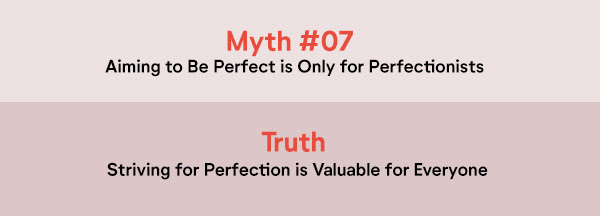“Strive on for Perfection” was the title of the fight song for my middle school. As a lazy, disaffected early adolescent I thought the idea of “striving” for perfection was ludicrous! I was struggling to just get by. Good often seemed out of reach. Roll forward 18 years to my Ph.D. program in psychology and I became a convert to the idea of defining perfection for oneself. Why?

My interest and attraction to the idea of perfection actually started with discussions among my professors and other graduate students about the concept of “development.” Most people think of development as gradual, inevitable change over time. For example, the Colorado River’s constant flow ripped through rock and over the millenia formed the Grand Canyon.
But if I say the young woman “developed” into a sensitive, generous global citizen, here the idea of “development” has changed a bit because a bunch of value judgments are likely involved in this observation. So development in this sense is not just change over time, but change towards a valued goal. This is introducing a value judgement into the concept of development.
Now here comes the concept of perfection. If we view development as having a dual meaning — change over time and change toward a desired goal — then in order to raise a child to be a good global citizen, for example, we must have a belief about what being a good global citizen entails.I suggest that we even have a concept of what a perfect global citizen looks like. I believe that we have models in our head of the perfect friend, the perfect spouse, the perfect parent, the perfect basketball player, etc. Each of us have our own definitions of perfection in these areas. The definitions relate to what we value. These values not only guide how we define perfection, but also what we consider to be “development” (i.e. changes that bring one closer to perfection).
Before you stop reading, let me suggest how this perspective on “development” and perfection relates to how we organise our day-to-day lives — and to philanthropy and The Life You Can Save.
Obviously, none of us is perfect — and we never will be! But I believe that knowing what perfection looks like is critical to guiding us to try and develop into the type of person we want to be. Religious people are guided by the Bible, the Koran or by the type of person Jesus, or Mohammed, or Buddha was. Jews are guided by the writings in the Old Testament and the Talmud.
Secular people have their models of perfection too in all the areas that matter to them. For example, when Diana and I were raising our two children based on our values, we had a very clear idea of what type of people we wanted them to become. We tried to create the conditions for them to “develop” into that type of person. When I was learning to play tennis, I copied Rod Laver and Ken Rosewell, who were as close to perfection as it got in tennis at that time. If you go to any playground where kids are playing basketball you will see them copying the moves of Michael Jordan, Lebron James, or their favorite current star. These models constitute their idea of perfection and guide the “development” of their game.
Peter Singer’s updated 10th anniversary edition of The Life You Can Save is our guide as to how to move towards perfection in personal giving. It emphasises helping people living in extreme poverty in a highly impactful, cost-effective way. It focuses on contributing a higher percentage of our income and wealth than we may have been comfortable with. None of us are perfect philanthropists — not even Peter — but knowing what we are attempting to achieve helps us become better.
At The Life You Can Save, we suggest utilizing the idea of “personal best” to help move towards being a better philanthropist. This entails looking at what it would mean to be perfect (i.e. according to what you most value) and “developing” a plan to come closer to perfection each year. We always suggest giving more and giving more effectively and we at The Life You Can Save try to practise this ourselves. Our highest values focus on saving lives and reducing suffering, which is why we recommend the nonprofits that we do.
The fact that you won’t be perfect should not stop you from developing a plan to live your values more each day, each year. What I am suggesting in this writing is that knowing what you are trying to achieve (i.e. having a concept of perfection) will help you get closer to perfection, as long as you don’t get discouraged. Setting achievable short-term goals that bring you closer to the goal you are aiming for is a way to avoid discouragement and to do better.
So “Strive on for Perfection,” but do it one step at a time!
Do Good. Feel Good.



